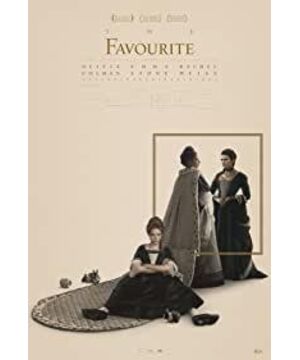Abigail (played by Emma Stone) from a fallen nobleman is portrayed as a weak and easily bullied party from the beginning of the film. When she just stepped out of the carriage, she was maliciously made to lie on the street and covered with dirty dirt by an obscene, "self-touching" man; she was cleaning the floor in the kitchen, but was played with and tricked by the servants she worked with; After helping the queen to apply herbs, she "crossed the line" and broke into the queen's room, causing her to endure multiple beatings. But when the queen passed by, Abigail coughed a few times on purpose, and told herself that she was cold because she helped the queen pick herbs, which also reflected that she had already made up her mind and tried her best to ascend to the throne as soon as possible. .
And Sarah (Rachel Weisz), who is related to Abigail, has known the Queen since childhood and has a deep relationship. After the queen ascended the throne, she assisted her in handling state affairs, called her by her first name in private, and treated her almost equally with the queen (in history, Sarah ruled in the palace for a long time, and her husband John Churchill held military power and became the British most powerful man). Therefore, one of the differences between "The Favourite" and the palace fighting dramas in mainland China and Hong Kong is that Sarah, one of the "favourites", not only caters to the queen in the harem, on the contrary, she dares to say that the queen looks like a badger ( "You look like a badger"), not an "angel who fell into the mortal world", and Sarah will also stop her from drinking hot chocolate for the sake of the queen's body... Sarah, who has a strong "enterprise", does not want to be a queen. Rabbit raised up and raised, but has been playing the role of a hunter who shoots animals until she falls out of favor. She is different from Abigail who caters to the queen, and the "games" they pursue and play are not the same ("We are playing very different games ").
Abigail, who was once degraded, did not want to be driven back to the streets and sold his ass to soldiers with syphilis, so he would do anything to get to the top. She helped the Queen pick herbs and rub her feet, but she was not thinking of the Queen; she married Colonel Masham, but she used her husband as a "shield" or even a "stepping stone" (whether Colonel Masham or Sarah's husband, or Members of the Whigs, Tories, men in this film, become an appendage of one by one). After Abigail entered the palace, almost everything she did was for herself. She secretly saw the queen's desire for Sarah's body, so she decided to take a risk, take off all her clothes and lie on the queen's big bed, to seduce the queen; and when Sarah witnessed the two of them lying on the bed after the incident, Abigail showed particular " The eye-catching" breast (in this scene Emma Stone asked for a dew point), has a very strong meaning of declaring that he has been favored (if Abigail did not dew point, the whole picture would be greatly weakened, the kind of We can substitute the shock of Sarah's mood at that time).
The movie "The Favourite" uses the passage of Sarah and Abigail hunting as a metaphor for the two of them (especially Abigail) aiming at the prey (the queen). In the beginning, Abigail is a prey that can't hit the flying, but under Sarah's teaching (implying that Sarah takes her close to the queen and guides her to integrate into the life of the palace), Abigail's marksmanship is getting better and better. She even pointed the gun directly at Sarah (see the picture below), this scene (putting the shotgun in the foreground to make it more aggressive) is undoubtedly an obvious provocation to the opponent; "(Bringing the horse over), is a related phrase; but then Abigail hits the prey with a single shot and splatters the blood of the prey on Sarah's face, foreshadowing that she will destroy Sarah's image and disadvantage.
Now let's talk about Queen Anne, who seems to be incompetent and incapable of handling state affairs. She is vulnerable, sensitive, innocent, and prone to tantrums or childish tempers (Anne goes back to her room lost after Sarah says she looks like a badger, calling her servant out on the way); she Needing Sarah's help and care is like a child's dependence on his mother (so when Abigail was favored, the breast she exposed suggested that she had begun to replace Sarah's "mother" role/position). Queen Anne's desire for love may have something to do with her 17 children being either stillborn or unfortunate. In the dance scene, when the Queen watched Sarah dance with her male partner, her face changed from happy to unhappy, reflecting her inner frustration that she couldn't participate because of gout and foot pain, and also directly reflected her sensitivity. Or fragile ( here it is very subtly expressed that the "favourite" thing not only happens between Sarah and Abigail, even the high-ranking queen, sometimes because of the extreme need for love, will be "jealous" and jealous feel ). The film uses cold colors to set off the Queen's sad and pessimistic inner world. She can't tolerate the joy of dancing with others, and sometimes even the palace band playing outdoors can harmonize the cold colors in the film. The warmth cannot be tolerated.
Rachel Weisz, who plays Sarah, is tough, confident, and outdone for much of the film (and her disposition hasn't changed much since her character's disfigurement). It's not that she is not good at acting, but when it comes to the sense of hierarchy, or the integrity of the character's experience from low to high, and then back down, Emma Stone's Abigail will have more room to play (personally, Emma Stone's performance , which is a step up from her "Queen" work "La La Land"). But even so, Olivia Colman, the queen in the play, is still able to stand out among two such excellent actresses, which is really powerful! She revealed Queen Anne's superficially simple, yet complex or somewhat contradictory personality (both innocent and sometimes frighteningly domineering); and in the latter part of the film, her "facial paralysis" style performance ( In the play, Queen Anne's gout became more and more serious, resulting in partial paralysis of the facial muscles), and the final strong rebound, stubbornness showed a lost and sentimental expression (see the picture below), which can be imprinted in people's minds. .
Director Yorgos Lanthimos likes to incorporate "animal elements" or metaphors about animals into his works ("The Lobster", "The Killing of a Sacred Deer"). In this film, the badger is referred to as Queen Anne, and the duck competition shortly after the film starts, or the duck held by the former Prime Minister Godolphin, can also be compared to the competition of the contenders, or the person favored by the queen. In addition, the prey targeted by Sarah and Abigail, in addition to alluding to Queen Anne, can also be regarded as the opponent they are ready to attack (ie each other); and the rabbits raised by the Queen are not only the ones she lost. The child's stand-in is also more obviously "fused" with himself and Abigail (the two of them and the rabbit are also superimposed at the end of the film). While Abigail continues to affect the relationship between the Queen and Sarah, causing them to become more and more alienated, the rabbits are also freer and less caged, so we can think of Sarah as limiting the Queen ( and Abigail's "shackles", after Sarah gradually "fade out", no one would stop the queen from drinking hot chocolate, and Abigail became more indulgent, even daring to step on the queen's favorite rabbit.
Fiona Crombie and Alice Felton, who are in charge of the production design and set decoration of the film, deliberately used some larger interior furnishings - such as the huge oil painting in the queen's room, and her 14-foot-tall canopy bed, To make the characters in the room appear small, isolated or helpless; in addition, the corridors and other places in the palace are also deliberately left blank, and this vast space cooperates with the fisheye and wide-angle lenses used in the film, bringing out the The emptiness or loneliness of the protagonist (these are more deliberate fisheye, wide-angle shots, but they can reflect the inner distortion of the characters and reinforce the sense of absurdity that the film sometimes seeks). The film uses natural light or candles as the light source ("temperament" is reminiscent of Kubrick's "Barry Lyndon"), and the image is soft (it "neutralizes" the gorgeous, gaudy decorations, clothing, and makeup role), especially the darkness of the night scene, it can better express the unpredictability or hidden desires of people's hearts, like Abigail's self-declaration showing her breasts, the scene where she officially ascended the throne, happened in the dark room of the queen at night.
Compared to Yorgos Lanthimos's previous work, "The Favourite" is easier to "digest", but even so, the film's unusual camera shots, or the queen's own tidy room with messy snacks and cakes The plots that "disrupt" the rhythm of the film, the two scenes of the duck race and the throwing of fruit to the naked man, continue the director's bizarre creative characteristics or style. The film "The Favourite", although the history and events at that time are treated as "background", the struggle between the two parties is also superficial (from this, it can be seen again that Lanthimos's film lacks in-depth content discussion, the form is more than "Actual"), but the shaping and characterization of the characters in the film is undoubtedly a success. In the two paragraphs of Sarah and Abigail's burning letters, the two have different purposes - one is for each other's love, the other is to keep their status, but when the heartless Abigail saw the letter Sarah wrote to the queen may also have been moved to tears by the love she showed to the queen. The three female protagonists have no real winner. Even Queen Anne and Abigail, who thinks they have won, are "trapped" in the gorgeous palace for many times in the film, and are also trapped in the thirst for true love or the desire to be loved. In the cage of pampering pursuits.
View more about The Favourite reviews











